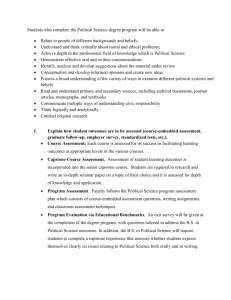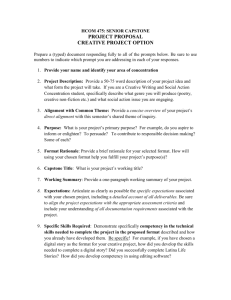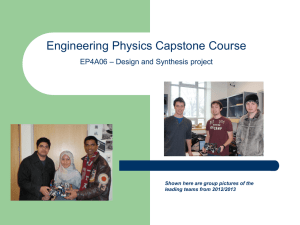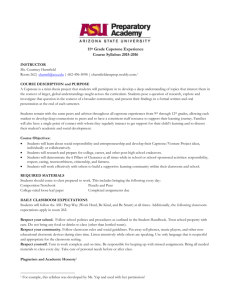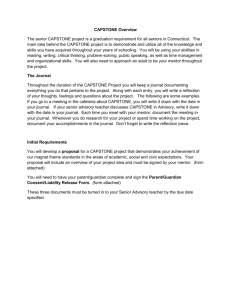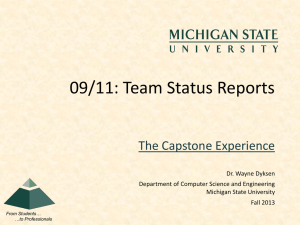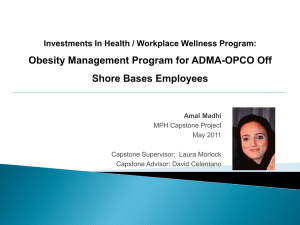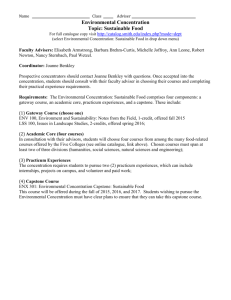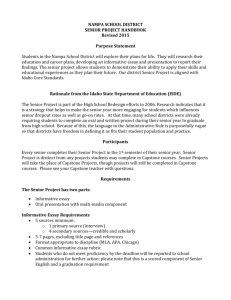2015 - Saint Louis University
advertisement
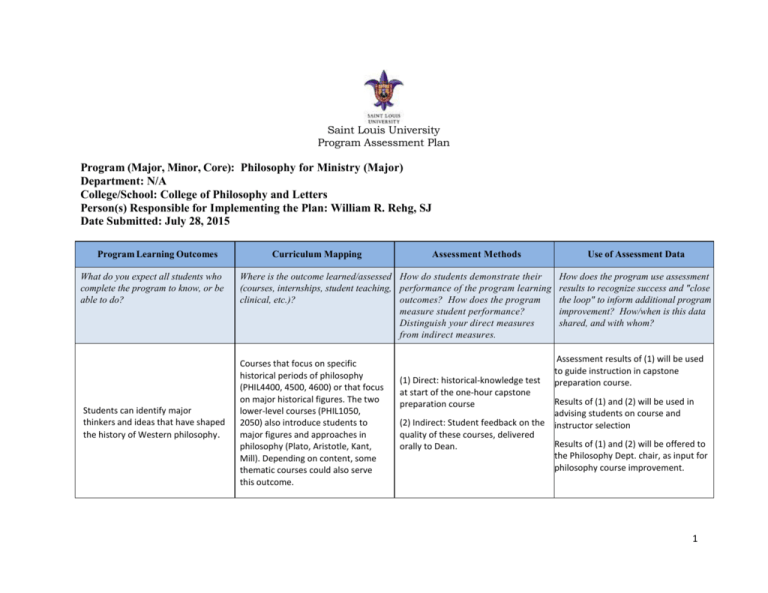
Saint Louis University Program Assessment Plan Program (Major, Minor, Core): Philosophy for Ministry (Major) Department: N/A College/School: College of Philosophy and Letters Person(s) Responsible for Implementing the Plan: William R. Rehg, SJ Date Submitted: July 28, 2015 Program Learning Outcomes What do you expect all students who complete the program to know, or be able to do? Students can identify major thinkers and ideas that have shaped the history of Western philosophy. Curriculum Mapping Assessment Methods Where is the outcome learned/assessed How do students demonstrate their (courses, internships, student teaching, performance of the program learning clinical, etc.)? outcomes? How does the program measure student performance? Distinguish your direct measures from indirect measures. Courses that focus on specific historical periods of philosophy (PHIL4400, 4500, 4600) or that focus on major historical figures. The two lower-level courses (PHIL1050, 2050) also introduce students to major figures and approaches in philosophy (Plato, Aristotle, Kant, Mill). Depending on content, some thematic courses could also serve this outcome. (1) Direct: historical-knowledge test at start of the one-hour capstone preparation course Use of Assessment Data How does the program use assessment results to recognize success and "close the loop" to inform additional program improvement? How/when is this data shared, and with whom? Assessment results of (1) will be used to guide instruction in capstone preparation course. Results of (1) and (2) will be used in advising students on course and (2) Indirect: Student feedback on the instructor selection quality of these courses, delivered Results of (1) and (2) will be offered to orally to Dean. the Philosophy Dept. chair, as input for philosophy course improvement. 1 Two courses: (1) the one-hour capstone preparation course, in Students are able to state and explain which students develop a set of philosophical positions across four key philosophical ideas and methods areas of philosophy most relevant suitable for understanding and analyzing contexts of Catholic ministry. to their capstone project; (2) the capstone course, in which students apply their philosophical views to a specific challenge that arises in some context of ministry Students can analyze specific challenges in the contexts of Catholic ministry using philosophy and other relevant knowledge. The capstone course, in which students apply their philosophical views, along with other knowledge they have gained in relevant courses and research, to the analysis of a specific challenge of ministry Direct (1): The capstone preparation course grade (P/NP) depends on satisfying this outcome. Direct (2): The capstone course grade will be based partly on satisfaction of this outcome; Dean will collect data from the instructor that indicates level of achievement of the specific outcome. Indirect: Student and instructor feedback on the quality of these courses (exit survey, course evaluations) Direct: The capstone course grade will be based partly on satisfaction of this outcome; Dean will collect data from the instructor that indicates level of achievement of the specific outcome. Indirect: Student and instructor feedback on the quality of these courses (exit survey, course evaluations) Results will inform program development and advising on core, required philosophy courses, and electives Specific improvements in the capstone preparation and capstone will be made to address identifiable weakness revealed by assessment Specific improvements in the capstone preparation and capstone will be made to address identifiable weakness revealed by assessment Successes will be celebrated in conjunction with the oral exam (required of all Jesuit students to meet ecclesiastical requirements). 1. It is not recommended to try and assess (in depth) all of the program learning outcomes every semester. It is best practice to plan out when each outcome will be assessed and focus on 1 or 2 each semester/academic year. Describe the responsibilities, timeline, and the process for implementing this assessment plan. 2 The first item for assessment will be outcome 1, knowledge of the history of philosophy and its basic themes. This assessment will be conducted in Fall 2015. Results of the assessment will, in the short run, inform future course advising for P&L students, beginning in Spring 2016. In the long run (2017 – 2019), results will be used in discussing possible course innovation in the Philosophy Department. Outcomes 2 and 3 will be assessed in Spring 2017, after evaluation of the specific outcome measures/assessment methods used in the pilot capstone course in Spring 2016. 2. Please explain how these assessment efforts are coordinated with Madrid (courses and/or program)? –N/A 3. The program assessment plan should be developed and approved by all faculty in the department. In addition, the program assessment plan should be developed to include student input and external sources (e.g., national standards, advisory boards, employers, alumni, etc.). Describe the process through which your academic unit created this assessment plan. Include the following: a. Timeline regarding when or how often this plan will be reviewed and revised. (This could be aligned with program review.) The plan will be evaluated for possible revisions in Summer 2016, after the evaluation of the pilot capstone assessment methods and capstone preparation course. In addition, possible plan revisions will be informed by results of a national Jesuit study of formation centers (anticipated in Spring 2016) and subsequent discussion with other First Studies Directors at University of Loyola-Chicago and Fordham University. Plan revision will occur in consultation with the relevant course instructors (esp., the capstone course instructors, but also instructors of key courses in the Philosophy Department) and the P&L Advisory Board. b. How students were included in the process and/or how student input was gathered and incorporated into the assessment plan. Student feedback over the last two years was instrumental in developing the second and third learning outcomes. This feedback was delivered informally (volunteered by individual students) and at an exit interview conducted with P&L students in Spring 2014. Such feedback also contributed to innovation in the capstone course, leading to the pilot course in Spring 2016. c. What external sources were consulted in the development of this assessment plan? The plan is based on learning outcomes in the statement on Intellectual Formation of Jesuits, issued by the Superior General of the Society of Jesus (revised version, June 2014) and explained by the General’s representative in his visit to SLU in April 2014. d. Assessment of the manageability of the plan in relation to departmental resources and personnel – This plan has been developed in view of existing resources; I do not anticipate additional resource needs in the short term. 3
